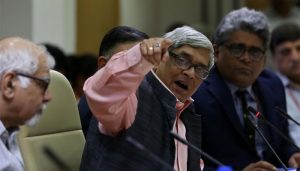 NewDelhi: The newly constituted Economic Advisory Council to the Prime Minister Narendra Modi (EAC-PM) in its first meeting stressed upon accelerating economic growth and employment.
NewDelhi: The newly constituted Economic Advisory Council to the Prime Minister Narendra Modi (EAC-PM) in its first meeting stressed upon accelerating economic growth and employment.
Chief Economic Adviser Arvind Subramanian gave a presentation to the council on ways to accelerate economic growth, including investments and exports by using a combination of different policy levers.
The industry is seeking fiscal stimulus to tide over the economic slowdown. The economic growth has slipped to a three-year low of 5.7 percent in the first quarter of the current fiscal.
The government pegged the fiscal deficit target at 3.2 percent for the current fiscal and 3 percent for the next financial year.
With the economy slowing down and joblessness becoming a major issue, the EAC-PM has identified 10 major priority areas over which it will prepare a report and submit it over the next six months.
The 10 themes were identified during the first meeting of the council chaired by NITI Aayog Member Bibek Debroy. The council was reconstituted a fortnight ago in what was seen as the government acknowledging for the first time the problem of economic slowdown.
Apart from giving recommendations to the Prime Minister on these issues, the EAC-PM would also focus on the next budget preparation over the coming months, Debroy told reporters here after the meeting.
During the meeting, Chief Economic Advisor Arvind Subramanian focused attention on accelerating economic growth — including investments and exports — using a combination of different policy levers.
The council took stock of the current economic, fiscal and monetary policy environment and resolved to focus on key identified issues.
“We have identified 10 themes that we would initially work on till we have our next meeting one month from now,” Debroy said.
“The 10 themes identified are economic growth, employment and job creation, informal sector and integration, fiscal framework, monetary policy, public expenditure, institutions of economic governance, agriculture and animal husbandry, patterns of consumption and production, and the social sector,” he added.
Debroy said the entire thrust of the council would be on specific implementable recommendations, which would distinguish it from other bodies.
“Our view will be on specific thing you can change,” he said.
The council members would come up with a report in the coming months through consultative processes with ministries, states, private sector and other stakeholders.
They would also come out with specific issue papers to address key concerns, a statement said.
Bureau Report
Leave a Reply